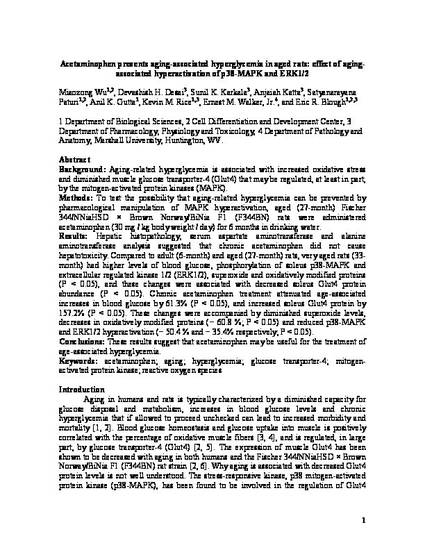
Background
Aging-related hyperglycemia is associated with increased oxidative stress and diminished muscle glucose transporter-4 (Glut4) that may be regulated, at least in part, by the mitogen-activated protein kinases (MAPK). Methods
To test the possibility that aging-related hyperglycemia can be prevented by pharmacological manipulation of MAPK hyperactivation, aged (27-month old) Fischer 344/NNiaHSD × Brown Norway/BiNia F1 (F344BN) rats were administered acetaminophen (30 mg/kg body weight/day) for 6 months in drinking water. Results
Hepatic histopathology, serum aspartate aminotransferase and alanine aminotransferase analyses suggested that chronic acetaminophen did not cause hepatotoxicity. Compared with adult (6-month) and aged (27-month) rats, very aged rats (33-month) had higher levels of blood glucose, phosphorylation of soleus p38-MAPK and extracellular-regulated kinase 1/2 (ERK1/2), superoxide and oxidatively modified proteins (p < 0.05), and these changes were associated with decreased soleus Glut4 protein abundance (p < 0.05). Chronic acetaminophen treatment attenuated age-associated increase in blood glucose by 61.3% (p < 0.05) and increased soleus Glut4 protein by 157.2% (p < 0.05). These changes were accompanied by diminished superoxide levels, decrease in oxidatively modified proteins (−60.8%; p < 0.05) and reduced p38-MAPK and ERK1/2 hyperactivation (−50.4% and − 35.4%, respectively; p < 0.05). Conclusions
These results suggest that acetaminophen may be useful for the treatment of age-associated hyperglycemia.

This is the pre-peer reviewed version of the following article: Wu, M., Desai, D. H., Kakarla, S. K., Katta, A., Paturi, S., Gutta, A. K., Rice, K. M., Walker, E. M. and Blough, E. R. (2009), Acetaminophen prevents aging-associated hyperglycemia in aged rats: effect of aging-associated hyperactivation of p38-MAPK and ERK1/2. Diabetes Metab. Res. Rev., 25: 279–286, which has been published in final form at http://onlinelibrary.wiley.com/doi/10.1002/dmrr.932/pdf